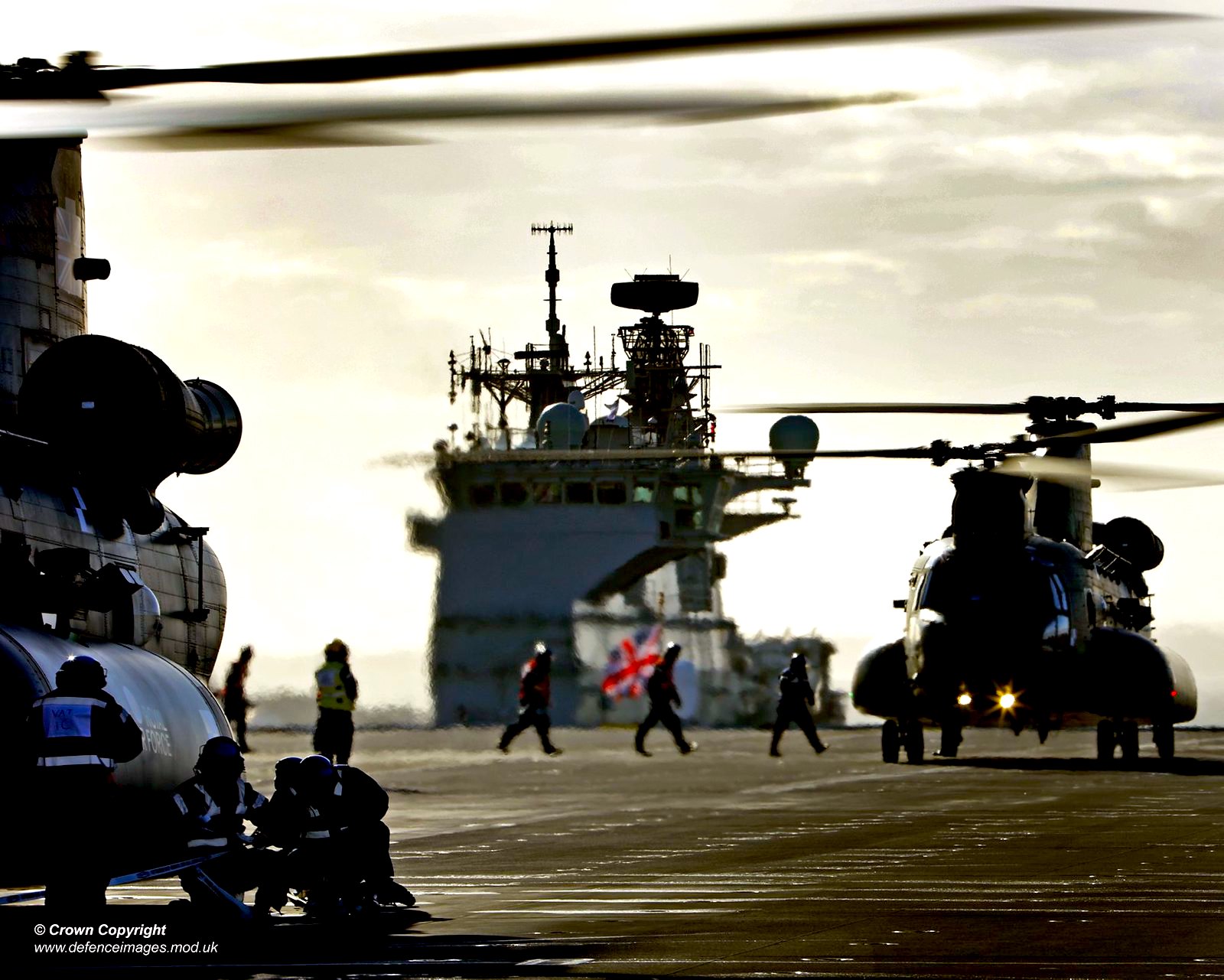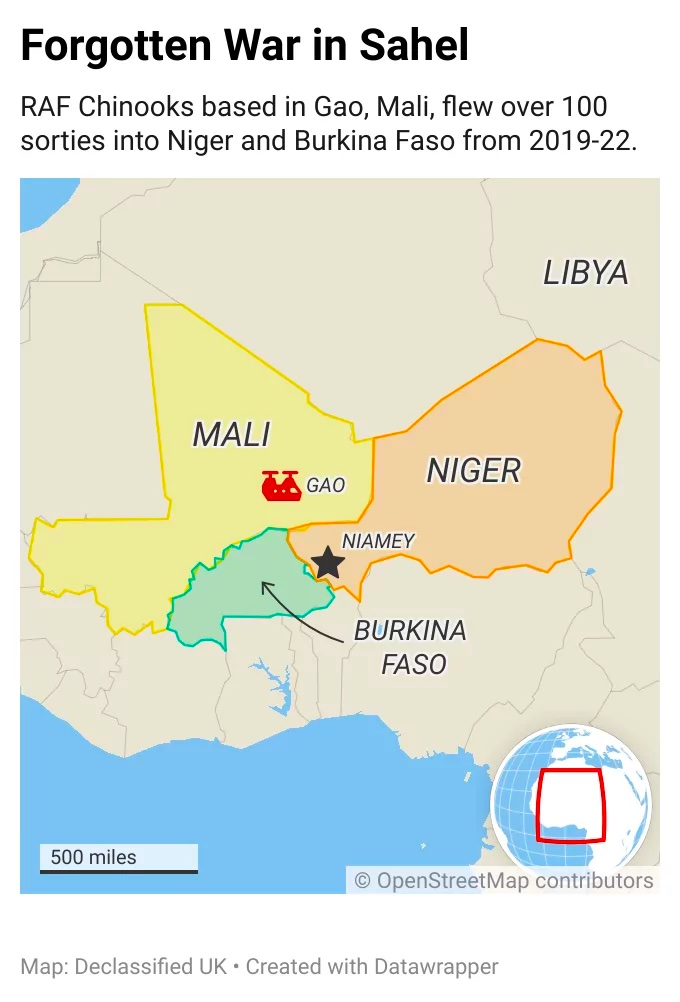As Niger expels U.S. troops, Declassified UK reveals British helicopters operated a taxi service for French forces in the uranium-rich African state, Phil Miller reports.

RAF Chinook helicopters land on HMS Queen Elizabeth in Portsmouth, 2018.(Defence Imagery, OGL, CC BY 2.0)
By Phil Miller
Declassified UK
- The RAF flew 39 helicopter missions into Niger before first publicly mentioning them
- Niger has been a “significant source” of uranium for EDF, the French company that runs Britain’s nuclear power plants
 Royal Air Force helicopters flew more than 100 missions into Niger and Burkina Faso ahead of military coups across west Africa.
Royal Air Force helicopters flew more than 100 missions into Niger and Burkina Faso ahead of military coups across west Africa.
The revelation comes as Niger’s junta expelled U.S. forces on March 17. Thousands of French troops had already been kicked out last year following the coup.
America and France, the former colonial power, stationed troops in Niger throughout the war on terror in a supposed effort to stamp out attacks by Islamic extremists.
However their presence had become deeply unpopular after they failed to stop a surge in violence that spilled over from NATO’s toppling of Libya’s Gaddafi regime in 2011.
[See: Niger, ECOWAS & Western Imperialism in Africa]
Niger is one of the world’s poorest countries despite being a major supplier of uranium for nuclear power plants.
Little is known about British involvement with France’s failed counter-terrorism campaign in Niger. The RAF only made a one reference in passing to the Niger sorties in a wider press release about a deployment to Mali.
It said the twin-rotor Chinook helicopters
“first arrived in West Africa during July 2018 to provide a heavy lift helicopter support capability to [France’s] Op Barkhane. The Chinooks therefore regularly carry out troop movements, resupply missions and logistical support to the French forward operating bases and desert locations around Mali, Burkina Faso and Niger.”

RAF engineer servicing an RAF Chinook Ch-47 helicopter deployed to Mali in support of the French-led Operation Barkhane, August 2018. (Royal Air Force, Wikimedia Commons, Public domain)
While most publicity focused on the Chinook operations in Mali, their cross-border flights largely escaped scrutiny.
Declassified has found that RAF Chinooks flew 57 sorties into Niger from Mali between February 2019 and June 2022, and a further 58 into Burkina Faso. The data was disclosed in a freedom of information response from the Ministry of Defence (MoD).
The RAF did not publicly mention the Niger sorties until mid-2021, by which time Chinooks had flown 39 missions into the country.
Records show there were up to three cross-border sorties a day, transporting dozens of French troops and tonnes of supplies. Based at Gao in a remote region of Mali, the Chinooks flew to Niger’s capital and parts of Burkina Faso, at a cost of more than £13 million per year.

(Declassified UK/ Created with Datawrapper)
Uranium
All three countries have recently seen military coups, largely in protest at the failure of Western interventions to bring stability. The coups worried NATO elites who feared Russia’s Wagner group would fill the vacuum and jeopardise uranium supplies.
French state-owned energy giant EDF, which runs all of Britain’s nuclear power plants, told a U.K. parliamentary committee months after the coup:
“Canada and Kazakhstan make up over 50 percent of our uranium ore supply. Niger remains a significant source, but due to the recent instability our large supply chain has been flexed to cover any disruption and no issues have been seen.”
Energy security minister Andrew Bowie was initially unable to tell MPs where Britain obtained its uranium, as “the sourcing of fuel for the U.K.’s operational civil nuclear power plants is a commercial decision for the plant operator”.
British troops pulled out of Mali in November 2022 following an anti-Western coup, ending all Chinook operations in the Sahel region. Niger’s military staged its coup last July and immediately indicated French troops would have to leave.
Abdoul Kader Amadou Mossi, from the Diaspora Association of Niger Republic Nationals in the United Kingdom (Darn-UK), said: “We want the French army out of Niger.”
Speaking to Declassified from a protest outside the French embassy in London, he explained: “Despite their presence, the terrorists are killing a lot of people. There is no peace in our country.”
He added:
“Before NATO intervened in Libya, our African leaders, especially my president, had approached Barack Obama and Western leaders to catch their attention that they should not intervene in Libya because…it’s going to affect the whole region. They didn’t listen to him…and after Gaddafi died, the regime has fallen but there’s no peace any more.”
Phil Miller is Declassified UK’s chief reporter. He is the author of Keenie Meenie: The British Mercenaries Who Got Away With War Crimes. Follow him on Twitter at @pmillerinfo
This article is from Declassified UK.

This feels like a bit of a nitpick, but this article is at times difficult to read due to some of the phrasing. Specifically, the constant mention of Chinooks makes it hard to process, as there were in fact no Chinooks in Niger, only Boeing Chinook helicopters. For those of us more familiar with history than the vulgar Americanism of naming weapons and gadgets after ethnic groups systematically slaughtered by the state, it’s painful to read Chinooks this, Chinooks that, etc, without any actual Chinookan involvement.
I would appreciate if the author would consider writing RAF Chinooks, Chinook helicopters, etc, in the future, for mainly the simple reason of it being easier in syntax to read to those familiar with history, although the fact of weapons having been named after extinguished ethnic groups by the people who killed them (or their direct military successors) and casually referred to in their place without such distinguishment (obviously not intentionally on the author’s part, as after all it wasn’t they who named them in the first place and many are unaware of the namesakes) is something worth thinking about, too.
“Niger is one of the worlds poorest countries despite being a major supplier (owner) of Uranium”. I can’t predict how well the new military regime will serve its citizens but it seems that it can hardly do worse than what they got from its European colonizers. Kinda like Milei in Argentina. When you’re at the bottom, the only path is upward.
Everywhere there are Brit footprints, there is trouble. They are our little brothers. Doing the bidding of Uncle Sugar’s Military Industrial complex.
It took a while for the French to get out of Niger following numerous protests that the coup government was not “legitimate,” but gone they now are and this should set precedent to get the US out.
Valuable source on this region (africanews.com as with this article:)
hxxps://www.africanews.com/2023/08/16/niger-niamey-residents-support-call-for-mass-recruitment-of-volunteers-into-army/
Very good, thanks.
Miller as delivers a mostly empathetic account. However, some probably inherited selective language gets problematic in this context.
* The power kicked out is “colonial,” truly enough, yet those who accomplish this are “Islamic extremists.” Extreme how? Because they worship, because they fight colonialism, or for some other reason?
* By contrast, the people who impoverish Niger to extract fissile materials for war and pollution are not extreme, even when Macron baits a nuclear response to support Nazis in Ukraine and the overlords who cut energy pipelines to Europe. Moderate how?
* We do already know that US and French troops “failed to stop a surge in violence” because they caused it by toppling Gaddafi’s government in Libya. Surely they are indeed unpopular, but it was not a failure of cheesecake smiles that led to this response across the Sahel. We are not talking about sophomores at a sorority.
Again, bravo to Phil Miller, Declassified UK, and to CN for bringing valuable fresh news, and I do not mean to obscure the good work by my quibbles. I would be glad to see other perspectives and further discourse here.